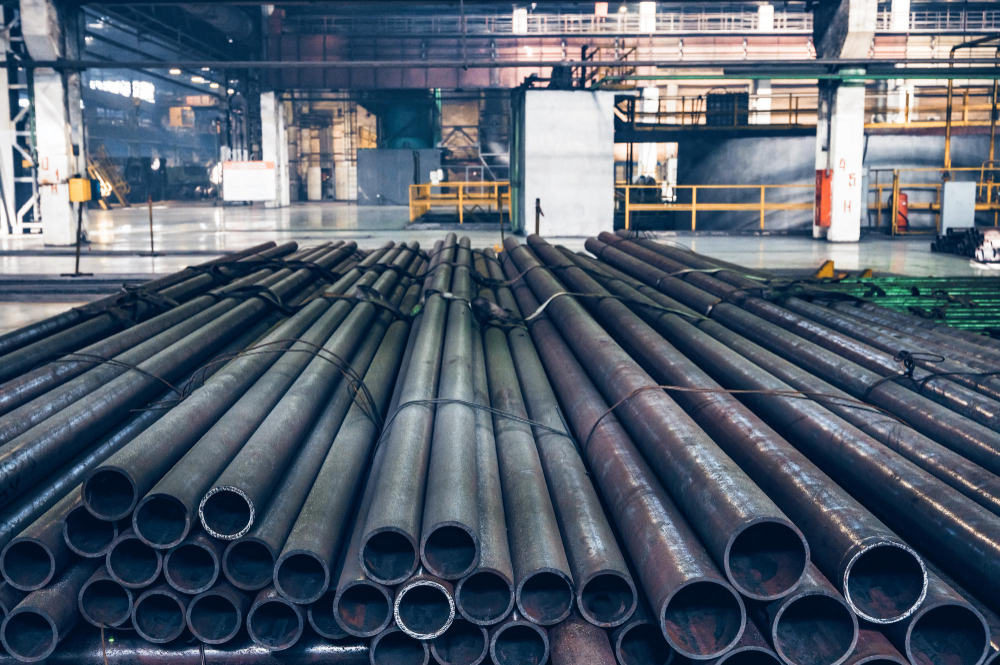Welcome to the world of steel pipes, where strength meets versatility. Steel pipes are everywhere: in buildings, cars and pipelines. They’re strong and reliable, ideal for demanding jobs. However, not all steel pipes are the same; they come in various types for different needs. Whether it’s carbon steel for construction, stainless steel for corrosion resistance or alloy steel for high strength, finding the right steel pipe matters. That’s why knowing the best “steel pipe suppliers near me” is crucial.
1. Deciphering Steel Pipe’s Varieties and Applications
Steel pipes, integral to countless applications, are not a one-size-fits-all solution. Their variety is vast, encompassing different sizes, thicknesses and materials to cater to specific needs. Key types include carbon steel, stainless steel and alloy steel pipes, each with unique attributes. Carbon steel pipes are known for their strength and versatility, making them suitable for infrastructure and construction projects. Stainless steel pipes offer corrosion resistance, ideal for use in chemical or water transport. Alloy steel pipes, combining various metals, are chosen for their high strength and resistance to wear and tear. This diversity underscores the importance of finding knowledgeable steel pipe suppliers who can provide guidance on the best type for a particular application, be it in the construction, automotive or energy sectors.

2. Steel Pipe’s Their Pervasive Role
The omnipresence of steel pipes across industries is undeniable. In construction, they form the backbone of structural frameworks and are crucial in transportation systems for water, gas and oil. Their high strength-to-weight ratio makes them ideal for these demanding applications. In the automotive industry, steel pipes are used in manufacturing critical components like fuel injection systems and exhaust pipes. The oil and gas sector relies heavily on steel pipes for drilling and transporting products. Each industry’s unique requirements highlight the need for specialized “steel pipe suppliers near me” who can provide products that meet exacting standards and specifications.
3. Why Steel Pipes Lead the Way
Compared to other materials like PVC or concrete, steel pipes offer unparalleled advantages. Their high tensile strength allows them to withstand extreme pressure and temperatures, making them a preferred choice in industries where safety and durability are paramount. The corrosion resistance of certain steel pipes ensures longevity and reliability, particularly in corrosive environments. Additionally, steel pipes can be recycled, aligning with sustainable practices. The benefits of steel pipes make it crucial for buyers to seek steel pipe suppliers who understand these advantages and can provide high-quality products that meet their specific needs.
4. Key Raw Materials In Steel Pipe Production
The quality of steel pipes starts with their raw materials. Primary among these is iron ore, the basic ingredient in steel manufacturing. Carbon steel, a common material for pipes, is created by combining iron ore with carbon, giving the pipes their strength and flexibility. Alloying elements like chromium, nickel and molybdenum are added to create different steel grades. These elements enhance properties such as corrosion resistance and strength at high temperatures. Understanding the composition and quality of these raw materials is critical for steel pipe suppliers. It ensures they can provide pipes that not only meet the required standards but also perform optimally in their intended applications.
5. Raw Material Traits
Each raw material used in steel pipe manufacturing imparts unique characteristics. Iron ore provides the fundamental strength and rigidity. Carbon, a crucial element in carbon steel pipes, enhances durability and tensile strength, making the pipes suitable for heavy-duty applications. Alloying elements like chromium in stainless steel pipes offer corrosion resistance, which is essential for pipes used in harsh chemical environments or for water transport. Nickel improves toughness and resistance to oxidation, while molybdenum increases high-temperature strength. For steel pipe suppliers, a deep understanding of these materials and their properties is essential. It enables them to advise customers on the best type of steel pipe for their specific application, whether it’s for a high-pressure gas line, a corrosive environment or an application requiring high-temperature resilience.
6. Choosing Right For Applications
When it comes to steel pipe manufacturing, the selection of raw materials is not just a step in the process; it’s a critical decision that impacts the overall performance of the pipes in various applications. For steel pipe suppliers, understanding the properties and behaviors of different materials is crucial. Manufacturers typically combine iron ore, carbon, and various alloying elements to create steel pipes. Each of these components contributes to the pipe’s strength, flexibility and resistance to corrosion.
Iron ore provides the basic structure and strength. To increase its hardness and durability, we add carbon to iron. Suppliers can add alloying elements like chromium, nickel, and molybdenum to enhance specific properties, such as improving resistance to high temperatures or corrosive environments. Suppliers must consider the end-use of the pipes – be it in construction, oil and gas or transportation – to determine the appropriate composition of materials. This tailored approach ensures that the pipes can withstand the demands of their specific applications.
7. The Birth Of A Steel Pipe
The transformation of raw materials into steel pipes is a complex and fascinating journey. The first step in this process involves the extraction and processing of iron ore. That is followed by the production of steel billets or coils, depending on the method of pipe manufacturing to be used. Steel pipe suppliers need to ensure the raw materials are of the highest quality to produce superior steel pipes.
In some pipe manufacturing methods, the process involves melting the steel and then casting it into long shapes known as billets, while in other cases, the molten steel is formed into coils. The choice between billets and coils depends on the intended pipe manufacturing method. This initial preparation is a meticulous process, requiring precise control of temperature and composition to achieve the desired quality. It sets the foundation for the strength and durability of the final product.
8. Forming Steel Pipes
The forming of steel pipes is a technical art involving two primary methods: seamless and welded. Heating and stretching a solid billet over a piercing rod creates a hollow shell, making seamless pipes a favored choice for high-pressure applications due to their uniformity and strength.
On the other hand, bending and welding the steel coil or plate create welded pipes. There are various welding methods, each suited to different types of applications and pipe sizes. For smaller diameters, manufacturers commonly use Electric Resistance Welding (ERW), while they prefer Submerged Arc Welding (SAW) for larger pipes.
Each method has its own set of advantages, and steel pipe suppliers must be adept at both to cater to diverse market needs. The choice of method depends on factors like the required pipe size, pressure ratings and end-use.
9. Perfecting The Steel Pipe
After the steel pipes are formed, they undergo several finishing processes to enhance their quality and performance. Heat treatment is a crucial step, which involves heating and then cooling the pipes under controlled conditions. This process improves the mechanical properties of the steel, such as its strength and toughness.
Other finishing processes include straightening, testing for imperfections and applying various coatings for corrosion resistance. According to the specific application requirements, we may also prepare the surface of the pipes, including painting or galvanizing them. These finishing touches are what set apart the products of top-tier steel pipe suppliers. The attention to detail in this stage ensures that the pipes not only meet but exceed industry standards and customer expectations.
10. The Art Of Quality Control
Quality control in steel pipe manufacturing is an elaborate and continuous process. It begins with the inspection of raw materials and continues throughout the manufacturing process to the final product. Steel pipe suppliers adhere to strict inspection procedures and standards to ensure the reliability and safety of their pipes.
We employ non-destructive testing methods like ultrasonic and radiographic testing to detect internal and external imperfections. Dimensional checks, visual inspections and hydrostatic tests are also part of the quality control process. These rigorous inspections and tests ensure that every pipe meets the required specifications and quality standards. The commitment to quality control is what defines the reputation and reliability of steel pipe suppliers.
In each of these steps, the expertise and meticulous approach of steel pipe suppliers plays a pivotal role in delivering steel pipes that are not just products but are vital components in the infrastructure of modern society.
11. Coating And Protection Techniques
Corrosion resistance is paramount in extending the longevity of steel pipes. Recognizing this, implement various coating methods to safeguard pipes against environmental elements. The most common coating techniques include:
- Galvanization: This involves coating the steel pipe with a layer of zinc, providing a barrier against corrosion. The process can be either hot-dip galvanization or electro-galvanization, depending on the application.
- Fusion Bonded Epoxy (FBE): FBE is a powder coating that provides excellent protection against corrosion and physical impact. Many prefer this method due to its strong adhesion and protective properties.
- Polyethylene Coating: Applied mainly for underground pipes, this method involves wrapping the pipe in a polyethylene film, providing excellent resistance against moisture and chemicals.
These coating methods not only extend the service life of steel pipes but also ensure they perform optimally in various environments. The choice of coating depends on the specific application and environmental factors, something that competent steel pipe suppliers can advise on.
12. The Future Of Steel Pipe Manufacturing
Steel pipe manufacturing has evolved as it adopts advanced techniques to ensure efficiency and quality. Steelpipe suppliers are increasingly leveraging these technologies:
- Electric Resistance Welding (ERW): ERW is a popular method for producing welded pipes. It involves using electrical currents to heat and fuse the edges of the steel strip, resulting in a robust and seamless-looking pipe.
- Submerged Arc Welding (SAW): For larger pipes, SAW involves forming a weld by submerging an arc under a blanket of flux. This process allows for deep weld penetration and is ideal for thick-walled pipes.
These advanced techniques enhance the mechanical properties of steel pipes, making them suitable for high-pressure and high-temperature applications. As technology advances, they continue to innovate, ensuring their products meet the ever-growing demands of various industries.
13. The Assurance Of Quality By Steel Pipe Suppliers
Quality assurance in steel pipe manufacturing extends beyond mere compliance with standards. It embodies a commitment to reliability and excellence. Steel pipe suppliers ensure quality through:
- Rigorous Testing: This includes hydrostatic tests, bend tests, tensile tests and non-destructive evaluations to ensure structural integrity and durability.
- Certification and Standards Compliance: Adhering to international standards like ASTM, API and ISO, suppliers guarantee that their pipes meet global quality benchmarks.
- Continuous Improvement Processes: Implementing quality management systems like Six Sigma or ISO 9001, suppliers continuously refine their manufacturing processes.
This comprehensive approach to quality assurance means that they don’t just deliver products; they deliver assurance and reliability with every pipe.
14. Steel Pipes and the Environment
Environmental responsibility is a crucial aspect of steel pipe manufacturing. Aware of the suppliers ecological footprint, adopt sustainable practices:
- Recycling and Reuse: Steel is highly recyclable, and many suppliers prioritize the use of recycled materials to minimize waste and reduce environmental impact.
- Energy-Efficient Manufacturing: Implementing energy-saving technologies and optimizing manufacturing processes reduce the carbon footprint.
- Waste Management: Proper disposal and treatment of by-products and waste materials from the manufacturing process are key to minimizing environmental harm.
By embracing these practices, steel pipe suppliers contribute to a more sustainable future, balancing industrial needs with environmental stewardship.
Your Steel Pipe Solution Awaits – Contact Us Today!
Are you in search of top-notch steel pipes for your projects? Your quest ends here! At Bigfoot Pipe And Piling, we offer premium steel pipes, expert guidance and unbeatable quality. Say goodbye to subpar options and make the smart choice today. With years of experience, we’re your trusted steel pipe suppliers. Don’t miss out on the best in the business.
